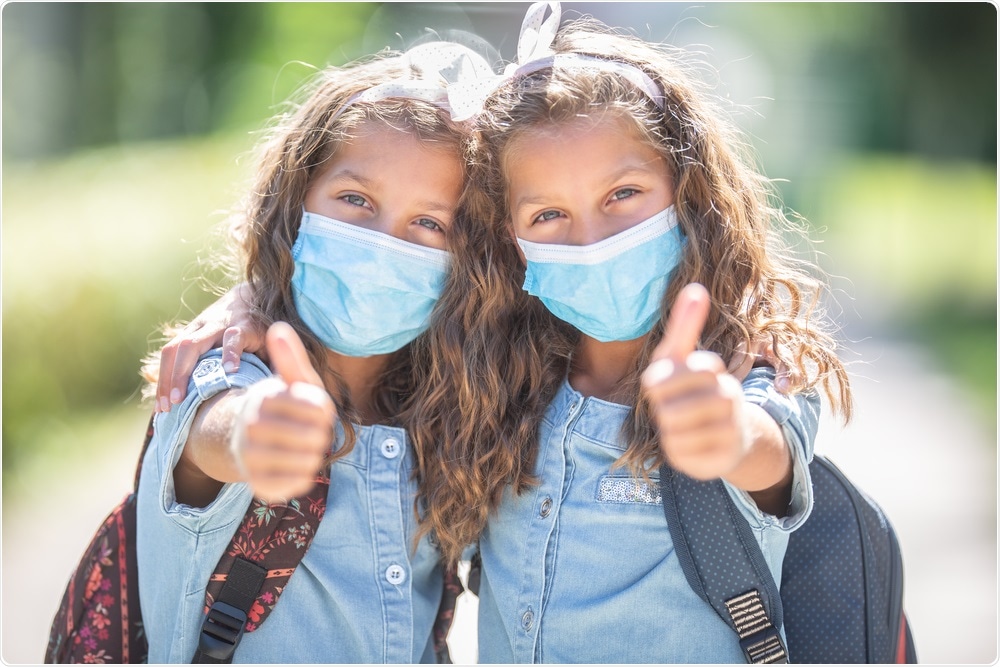As of October 7, 2021, the coronavirus disease 2019 (COVID-19) has caused over 4.82 million deaths worldwide. The need to identify the factors associated with the spread and virulence of the severe acute respiratory syndrome coronavirus 2 (SARS-CoV-2), which is the virus responsible for COVID-19, has prompted a host of studies.
 Study: “COVID-19 in twins: What can we learn from them?” Image Credit: Marian Weyo / Shutterstock.com
Study: “COVID-19 in twins: What can we learn from them?” Image Credit: Marian Weyo / Shutterstock.com

 *Important notice: medRxiv publishes preliminary scientific reports that are not peer-reviewed and, therefore, should not be regarded as conclusive, guide clinical practice/health-related behavior, or treated as established information.
*Important notice: medRxiv publishes preliminary scientific reports that are not peer-reviewed and, therefore, should not be regarded as conclusive, guide clinical practice/health-related behavior, or treated as established information.
Background
The emergence of SARS-CoV-2 in Wuhan, China at the end of 2019 was followed by the rapid development of several vaccines aimed at terminating community transmission of SARS-CoV-2 by increasing the level of herd immunity. Vaccine efficacy has since been challenged by the emergence of new SARS-CoV-2 variants that are more transmissible and sometimes more virulent than the ancestral strain.
Furthermore, some SARS-CoV-2 variants are able to escape neutralization by antibodies elicited from previous exposure to the ancestral virus antigens, either through natural infection or by vaccination. Such strains are called variants of concern (VOCs).
Earlier studies on the pathogenesis and severity of COVID-19 have included comparisons of the infection rate, severity, and adverse outcomes in pairs of monozygotic (MZ) and dizygotic (DZ) twins, as with other infectious pathogens. The aim is to detect a genetic component, if any, that contributes to the susceptibility.
The overall risk of illness or infection in a pair of twins will be equal if the susceptibility is determined mainly by environmental factors. Conversely, the presence of a genetic component will be shown by a higher degree of similarity in the outcomes among MZ twins, who have identical genetic codes, as compared to DZ twins, who have only fraternal degrees of shared genetic programming.
The current group of researchers has previously shown that the clinical features of the post-infectious illness Zika Congenital Syndrome (ZCS) in members of twin pairs showed discordance in accordance with the genetic makeup of the twin baby. This was despite the fact that both had been exposed to the virus during pregnancy.
In the case of COVID-19, such a head-to-head comparison is difficult because the members of a twin pair may not be equally exposed, besides the extreme variation in the clinical manifestations. Some infected individuals are completely asymptomatic, while others develop severe disease or even succumb to the illness, independent of age.
From an early stage, the illness and death of identical twins from COVID-19 have been reported to occur, with both dying within days or hours of each other. This began with a set of adult MZ twins who died three days apart in April 2020. This has raised questions about the involvement of genetic components in this disease. in close succession.
The current paper discusses the outcome of COVID-19 in ten twin pairs, half of which were MZ and half DZ twins. All twins included in the current study were from the city of Sao Paulo, Brazil.
Study findings
Among the twin pairs, at least one in each pair had tested positive for COVID-19. Both twins shared a bedroom and did not use any measures to protect themselves against the virus at home. In the majority of cases, the infected twin had got the infection from one or more relatives.
The researchers found that four of the five MZ twin pairs showed concordance for the infection. That is, both twins were either symptomatic or asymptomatic. However, the opposite was true of the five DZ twin pairs, with four of them showing discordance.
In the single MZ twin pair who did not show concordance, both were infected and exhibited symptoms of COVID-19. However, one was reinfected and developed severe illness, while the other had only a single episode of infection with mild symptoms.
This corroborates the findings of earlier reports of adult MZ twin pairs with discordant clinical presentations.
In one case, the twins had multiple common medical conditions, including type 2 diabetes, hypertension, and higher body mass index (BMI) values. Surprisingly, the twin with more medical complications had a milder and shorter episode, while the other was hospitalized with critical COVID-19.
In another, the individuals were healthy but one developed critical COVID-19 requiring mechanical ventilation, while the other recovered rapidly from a mild bout. This is the case even during congenital infections with pathogens, such as the human immunodeficiency virus (HIV) or cytomegalovirus, where MZ twins exposed to the same virus in utero nevertheless develop different clinical illnesses.
On the other hand, Brazilian media have reported on seven or more identical twin pairs who died within days or weeks of each other. Of these, six pairs were male, which agrees with the known increased risk for severe COVID-19 in this sex. However, these twins did not stay together, neither did they have any underlying illnesses. This indicates that genetic factors play a major role in the concordant clinical course.
Conclusion
“In conclusion, although these observations are derived from a small sample, the rate of discordance among DZ twins and the higher concordance in MZ gives further supports a complex multifactorial inheritance modulating the susceptibility or resistance against SARS-CoV-2 infection.”

 *Important notice: medRxiv publishes preliminary scientific reports that are not peer-reviewed and, therefore, should not be regarded as conclusive, guide clinical practice/health-related behavior, or treated as established information.
*Important notice: medRxiv publishes preliminary scientific reports that are not peer-reviewed and, therefore, should not be regarded as conclusive, guide clinical practice/health-related behavior, or treated as established information.